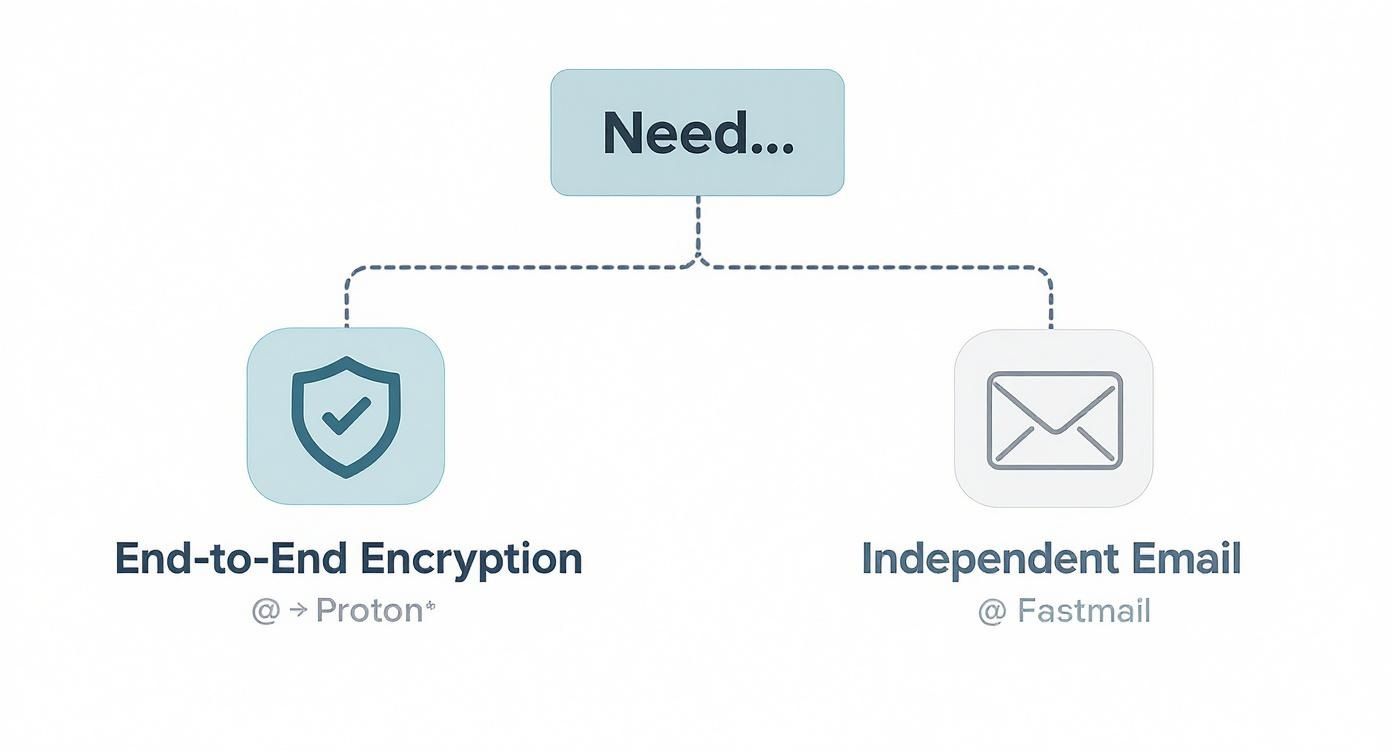Let's be honest, Google Workspace is a powerhouse. It’s pretty much the default for countless businesses. But that dominance is exactly why more and more organizations are starting to look for alternatives to Google Workspace, especially those that take email privacy and security seriously. The big reason? A growing unease about how major tech companies handle sensitive corporate data. This has kicked off a search for hosted email platforms with tighter security and clearer privacy policies.
Why Businesses Now Demand Google Workspace Alternatives

The hunt for a Google Workspace replacement usually boils down to one simple question: who's really in control of your data? For a growing number of businesses, the standard settings and vague data policies of mainstream providers just don't cut it anymore. They're demanding more control over their own information, particularly within their hosted email platform.
This is especially true for companies in tightly regulated fields like finance, healthcare, or law. They need ironclad email security to stay compliant. For them, proving that their communications are shielded from prying eyes isn't a "nice-to-have"—it's fundamental to staying in business.
The Push for Enhanced Email Privacy
A major factor driving this shift is a move away from business models that treat user data as a product. Many leaders are just not comfortable with the idea of their private conversations being scanned by algorithms, even if it's for something as innocent as developing new features. They'd much rather pay for a hosted email service where the service is the product, not their data.
This demand for true confidentiality has brought a few key email security features from the fringes into the mainstream. These are quickly becoming non-negotiable for any security-focused company.
- End-to-End Encryption: This is the gold standard for email privacy. It guarantees that only the sender and the person they're sending it to can ever read the message. Not even the service provider can peek.
- Zero-Access Architecture: This is an email security model where the provider physically cannot access your encryption keys. If they can't get the keys, they can't decrypt your data. Simple as that.
- Data Jurisdiction: Businesses are now paying close attention to where their data is physically stored, often choosing email hosting providers based in countries with robust privacy laws.
The core issue is control. Businesses want to manage their own digital security without being forced into a one-size-fits-all ecosystem that may not align with their email privacy commitments or threat model.
To really get why this matters, it helps to understand the essential cybersecurity strategies for businesses today. As we dig into the top hosted email platforms, we’ll be zeroing in on these critical security and privacy differences.
Comparing The Leading Secure Email Platforms

When you start looking for alternatives to Google Workspace, it quickly becomes obvious that no two hosted email platforms are created equal. Each one strikes a different balance between productivity, email privacy, and security, and figuring out those core philosophies is the first step to finding the right fit.
Let's meet the main contenders. First, you have Microsoft 365, the enterprise titan known for its deep email security features that large corporations rely on. On the other side of the spectrum is Zoho Workplace, an all-in-one suite with a privacy-first hosted email service that delivers incredible value.
Then you get into the specialists. Proton for Business is the undisputed champion for anyone who needs zero-access, end-to-end encrypted email as a non-negotiable. Finally, Fastmail offers a clean, independent, and high-performance hosted email experience for people who just want a rock-solid service without the corporate baggage.
A High-Level Snapshot
Each of these hosted email platforms is built around a different core strength. The right choice really hinges on what your organization needs most—whether that's ticking compliance boxes, ensuring total email secrecy, or finding an affordable and private ecosystem.
Think about it this way: what is the main threat you're trying to defend against? As you evaluate your options, consider how each one helps counter common email-based attacks like the dangers of email phishing. For one company, advanced threat detection might be the dealbreaker, while another might need an architecture that makes it impossible for even the provider to access their email data.
If you want to get a better handle on what makes for a truly private email service, our guide can help you discover the best email hosting providers for privacy and security in 2025. This background will make your decision-making process a lot clearer.
At a glance, the choice is between integrated ecosystems and specialized privacy tools. Microsoft and Zoho offer full suites with secure email, while Proton and Fastmail focus on perfecting secure email as their core mission.
To help you get oriented before we dive deeper, the table below gives you a quick snapshot of where each email hosting platform shines. Think of it as a starting point for understanding what each service truly brings to the table.
High-Level Comparison of Google Workspace Alternatives
| Alternative | Primary Strength | Ideal For | Key Email Privacy Feature |
|---|---|---|---|
| Microsoft 365 | Enterprise-grade email security and compliance | Large organizations with complex IT needs | Advanced Threat Protection & Data Loss Prevention |
| Zoho Workplace | Privacy-first hosted email in an all-in-one suite | SMBs and privacy-conscious businesses | Strong no-tracking, no-ads policy on email data |
| Proton for Business | Zero-access, end-to-end encrypted email | Journalists, legal firms, high-security teams | Automatic end-to-end encryption for emails |
| Fastmail | Independent, high-performance email hosting | Technical users valuing speed and privacy | User-funded model with no email data monetization |
This high-level view helps frame the distinct value you get from each service. Now, let's get into the specifics of what each one has to offer.
Microsoft 365 for Enterprise-Level Security

When you're running a large organization, the conversation around productivity suites shifts. It’s no longer just about user-friendly features; it’s about erecting a digital fortress around your most sensitive data, starting with email. This is precisely where Microsoft 365 shines, positioning itself not merely as one of the top alternatives to Google Workspace, but as a comprehensive email security framework built for the demands of enterprise IT.
Microsoft’s real strength lies in the deep, native integration of its email platform, Outlook, with its entire ecosystem. This creates a tightly controlled environment where administrators get granular control over email flow and access. For businesses in heavily regulated sectors, that level of command over their hosted email isn't a luxury; it's a necessity.
The market battle between these two titans is fierce. While Google Workspace currently leads with over 50% of the market share, Microsoft 365 is right behind, holding a commanding 45.5%. Together, they form a near-duopoly that dominates about 96% of the entire productivity suite market.
A Deep Dive into Email Security Architecture
Microsoft 365’s email security isn’t just about a good spam filter; it's a multi-layered defense-in-depth strategy designed to counter threats from every conceivable angle. This is what makes its hosted email platform so appealing to enterprises.
Its email security is built on several key pillars:
- Advanced Threat Protection (ATP): Now integrated into Microsoft Defender for Office 365, ATP is your proactive defense. It actively scans emails, links, and attachments for phishing and malware threats in real-time. Any suspicious file is detonated in a secure sandbox environment, far away from your actual network.
- Data Loss Prevention (DLP): This is where you set the email rules. Admins can configure robust DLP policies that automatically identify and safeguard sensitive data. For instance, a policy can be set to block any document containing credit card numbers or protected health information from ever being emailed outside the company.
- Compliance Certifications: Microsoft has put in the work to achieve a massive portfolio of compliance certifications. Whether your email hosting needs to meet HIPAA standards for healthcare or GDPR for European data privacy, Microsoft 365 has the paperwork to back it up.
Of course, the platform is only as secure as its configuration. For those managing the email component, our guide on how to secure emails in Outlook provides actionable steps to harden your defenses.
For an enterprise, the key benefit of Microsoft 365 is its ability to enforce email security policies consistently across every application and device, creating a single, manageable defense perimeter.
Real-World Use Case: A Financial Institution
Think about a major investment bank where an email data leak could trigger catastrophic fines and shatter client trust. This is a scenario where Microsoft 365’s email security tools become indispensable.
The bank’s IT team can configure specific DLP policies that immediately flag and block any email that contains sensitive client financial data. They can leverage ATP to fend off sophisticated spear-phishing campaigns targeting senior executives. This is the granular, policy-driven email security that large enterprises depend on from their hosted email platform.
Zoho Workplace: The Privacy-First Pick for SMBs
For small and medium-sized businesses, the search for a solid alternative to Google Workspace can feel like a compromise. You're often forced to juggle cost, features, and email security. This is where Zoho Workplace steps in, offering a powerful, budget-friendly suite built from the ground up with user privacy and secure hosted email in mind. It's an ideal choice for any business that believes its email data shouldn't be a product.
Zoho's entire business model is a refreshing change of pace. They have a very clear, public stance: they don't monetize your data. That means no scanning your emails to target you with ads or building invasive advertising profiles. For Zoho, email privacy isn't just a bullet point on a feature list; it's the core of their philosophy.
A Tightly Integrated and Secure Hub
Instead of forcing you to stitch together various services, Zoho Workplace delivers a fully integrated suite centered around its secure email platform. This design choice creates a naturally seamless and secure workflow, eliminating the need for third-party integrations that can introduce security vulnerabilities.
The suite bundles all the essential tools your team needs to work together effectively:
- Zoho Mail: The foundation of the suite—a secure, ad-free hosted email platform.
- Cliq: A real-time messaging tool for quick internal team chats and collaboration.
- WorkDrive: A cloud storage and content hub where teams can safely store, share, and manage all their files.
This all-in-one approach keeps your data safely inside Zoho's environment, shrinking your company's potential attack surface. Zoho Workplace is a genuinely compelling option for SMBs, especially given its competitive pricing. If you want to see how it compares to others, you can check out this analysis of Google Workspace alternatives.
Strong Email Security for Growing Businesses
Zoho definitely doesn't cut corners on the email security tools needed to protect business communications. The platform gives administrators real, meaningful control over their hosted email data, ensuring that sensitive information stays protected.
You get essential email security controls like S/MIME encryption, which lets users digitally sign and encrypt emails. This verifies the sender's identity and prevents anyone but the intended recipient from reading the message. On top of that, its advanced spam filtering and anti-phishing measures are built to catch malicious threats before they ever land in an employee's inbox.
For a growing startup, Zoho Workplace provides enterprise-grade tools with a privacy-first hosted email service on an SMB-friendly budget. It allows a business to scale with a full productivity suite while maintaining a user-centric privacy policy from day one.
Real-World Use Case: A Growing Tech Startup
Picture a new tech startup. Their budget is tight, but they are absolutely committed to protecting their intellectual property and client email data. They need professional hosted email, a shared place for documents, and a team chat app, but they're rightfully skeptical of platforms known for data mining.
Zoho Workplace is a perfect match. The team can immediately set up professional email addresses using their own domain and collaborate on projects, all within a single, secure environment where their email data is never for sale. This lets them focus on building their business, confident that their hosted email platform respects their privacy.
Proton and Fastmail: When Email Privacy is Non-Negotiable
Some businesses can’t just prefer email privacy; they absolutely require it. For these use cases, you need to look beyond mainstream suites and into specialized, privacy-first alternatives to Google Workspace like Proton and Fastmail. These are first and foremost secure hosted email platforms.
These services are built on a fundamentally different philosophy. Your email data is never scanned for ads, sold to third parties, or monetized in any way. For law firms or investigative journalists, a data breach is a catastrophic failure, and that's the exact problem these dedicated email security platforms are built to prevent.
Proton for Business: A Digital Fortress for Email
Proton for Business operates on a simple but powerful principle: they can't access your data, period. Headquartered in Switzerland, a country famous for its tough privacy laws, Proton uses a zero-access architecture for its hosted email. This means it's technically impossible for anyone at Proton to read your emails.
Even if a court ordered them to hand over your data, they couldn't decrypt it because they don't hold the keys—only you do.
This level of email security is built-in. Messages between Proton users are end-to-end encrypted by default. When you email someone outside the Proton network, you can still send password-protected, encrypted messages that self-destruct after a set time.
- Swiss Jurisdiction: Your email data is protected by strict Swiss laws, keeping it outside the reach of US and EU authorities.
- Zero-Access Encryption: The email hosting system is designed so that only you (and your intended recipients) can ever see your data.
- Encrypted Ecosystem: Proton isn't just email. It includes an encrypted calendar, cloud drive, and VPN, creating a secure bubble for your team's digital activities.
For organizations handling life-or-death information, Proton's hosted email is more than just a service—it’s a fortress. It’s designed from the ground up to withstand the highest possible threat levels, making it the only real choice when email data exposure is not an option.
Fastmail: Independent and Technically Superb Email Hosting
Where Proton builds an entire fortified ecosystem, Fastmail dedicates itself to doing one thing exceptionally well: providing a fast, reliable, and technically superior hosted email service. It’s entirely user-funded, which means its loyalty is to its customers, not to advertisers.
This independence frees Fastmail to focus on what email users actually need—speed, stability, and genuinely useful features. Their commitment to email privacy shows in their business model and their tools. One of the best examples is their masked email feature, which lets you generate unique, anonymous email aliases. If an alias gets hit with spam, you just delete it, protecting your real inbox and identity. It's a brilliantly practical tool for everyday email privacy.
Fastmail is also legendary among tech-savvy users for its incredibly snappy web interface and powerful search functions. It's built for people who demand efficiency from their email platform without compromising their principles on privacy.
How to Choose Between Them
Your choice between Proton and Fastmail really boils down to your specific threat model and email security needs.
A Quick Look at the Key Differences
| Feature | Proton for Business | Fastmail |
|---|---|---|
| Primary Focus | Maximum email security through a fully encrypted ecosystem. | A high-performance, independent hosted email experience. |
| Encryption Model | Automatic end-to-end encryption between Proton users. | Strong server-side encryption; relies on open standards. |
| Best For | High-security fields needing encrypted email like law, journalism. | Technical users and businesses valuing a private, fast email platform. |
| Standout Feature | Swiss legal protection and zero-access email architecture. | User-funded independence and powerful masked email aliases. |
If your organization needs a completely sealed-off environment where every email is encrypted by default, Proton is the answer. But if your main priority is a blazing-fast, technically advanced, and reliable hosted email service from a company you can trust, Fastmail is an outstanding choice.
How to Choose the Right Secure Platform
Picking the right secure hosted email platform is about more than just comparing feature lists; it’s about understanding what your organization truly needs to protect. The first question to ask is, "What's our email security threat model?" Are you trying to guard against common cyberattacks, or are you protecting highly sensitive data that could be targeted by sophisticated actors? Answering this will tell you whether you need a broad enterprise security suite or a more specialized, privacy-first email tool.
From there, you have to weigh the classic trade-off: convenience versus specialized email security. An all-in-one suite like Microsoft 365 or Zoho Workplace certainly makes life easier. But if your top priority is ironclad email confidentiality, a dedicated service like Proton simply offers a level of privacy that integrated platforms can't match.
This decision tree breaks down the choice between the top privacy-focused hosted email platforms.

As the visual shows, the choice often comes down to a fundamental philosophy. Proton is built for organizations where absolute, end-to-end encrypted email is non-negotiable. On the other hand, Fastmail is for teams that value a high-performance, independent email service that stands apart from the big tech ecosystem.
Once you’ve made your choice, the real work begins: the migration. To make that process as painless as possible, our complete migration guide for switching email providers offers a clear, step-by-step plan to get you from your old email host to your new one without a hitch.
Frequently Asked Questions
Thinking about leaving Google Workspace often brings up some very practical questions about email security and privacy. Teams I've worked with are often concerned about the logistics—how do you move years of emails, documents, and calendar events without causing a massive headache?
The good news is that most quality hosted email providers have really thought this through. They offer dedicated migration tools or step-by-step guides that take the pain out of the process, automating most of the heavy lifting.
Another common worry is collaboration. If you switch to a privacy-first email service, will you be cut off from clients and partners who are still on Gmail or Outlook? Not at all. Professional email is built on universal standards. You'll still be able to send and receive messages from anyone, regardless of their provider, so your core communication won't miss a beat.
How Does End-to-End Encryption Work in the Real World?
End-to-end encryption (E2EE) sounds technical, but in practice, it's pretty straightforward for email. Let's take a service like Proton as an example. When you send an email to another Proton user, it’s encrypted automatically. The message gets scrambled on your device and can only be unscrambled by the person you sent it to.
What about emailing someone on a standard service like Gmail? You can still send a password-protected, encrypted message. Your recipient simply gets a link to a secure webpage where they enter the password you shared with them to view the message. It's a simple, effective way to keep sensitive email conversations private, even when the other person isn't on the same hosted platform.
The bottom line is this: with true end-to-end, zero-access email encryption, not even the email provider can read your messages. You are the only one who holds the keys, giving you total control over who sees your information.
Is Migrating All My Data a Difficult Process?
Moving your data—emails, contacts, calendars—is one of those tasks that sounds a lot harder than it actually is. Most secure email providers have built tools specifically to pull your data from major platforms like Google Workspace.
The process usually looks something like this:
- Grant Access: You’ll temporarily authorize the new hosted email service to connect to your Google account.
- Choose What to Move: You get to select exactly what you want to bring over, like specific email folders or data from a certain time frame.
- Kick Off the Transfer: The tool gets to work in the background, securely copying everything to your new home.
While a big email migration might take a little while to complete, the process itself is mostly hands-off. It’s designed to minimize disruption and get you up and running smoothly on your new, secure email platform.
Ready to take back control of your email privacy? Typewire provides secure, private email hosting with absolutely no ads, no tracking, and zero data mining. Start your free trial and feel the difference.

